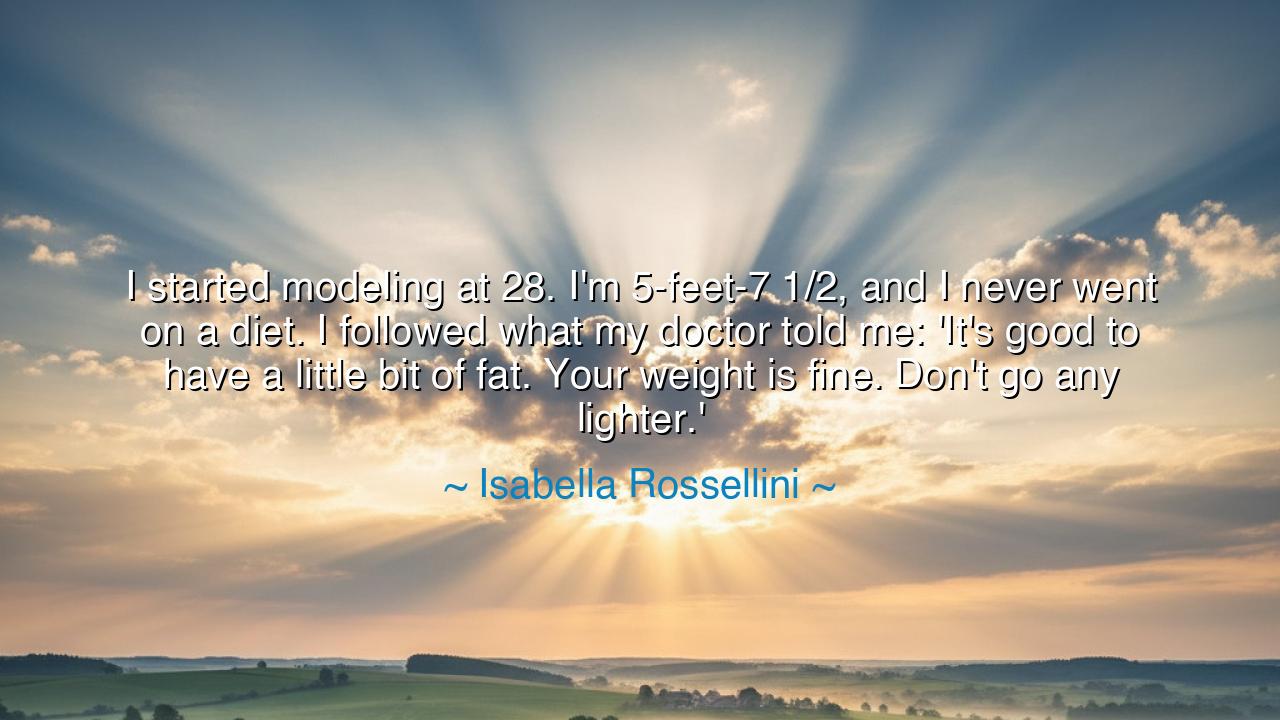
I started modeling at 28. I'm 5-feet-7 1/2, and I never went on a
I started modeling at 28. I'm 5-feet-7 1/2, and I never went on a diet. I followed what my doctor told me: 'It's good to have a little bit of fat. Your weight is fine. Don't go any lighter.'






In the words of Isabella Rossellini, “I started modeling at 28. I'm 5-feet-7 1/2, and I never went on a diet. I followed what my doctor told me: ‘It's good to have a little bit of fat. Your weight is fine. Don't go any lighter.’” there lies a rare and radiant wisdom, one that stands against the ceaseless tide of perfection that the world demands. Her words are a hymn to self-acceptance, a song of balance, and a gentle rebellion against the false gods of vanity and excess. In her quiet confidence, Rossellini echoes a truth that even the ancients once held sacred—that beauty is not born of denial, but of harmony between body, mind, and spirit.
To say, “I never went on a diet,” in the world of modeling is to utter something almost revolutionary. The industry, with its obsession for thinness and control, mirrors the world itself—always striving for more, always fearing “too much.” Yet Rossellini’s defiance is not loud, but serene. Like a philosopher who has already glimpsed the futility of excess, she reminds us that strength lies not in restraint, but in contentment. Her choice to trust her body, to heed the voice of a wise physician rather than the chorus of critics, reveals a timeless lesson: to honor one’s natural form is to honor life itself.
In ancient times, this wisdom was well known. The Greeks, who revered both the athlete and the artist, believed in the ideal of kalokagathia—the unity of the good and the beautiful. To them, health and beauty were not achieved through starvation or strain, but through proportion and grace. The sculptor Polykleitos, in his Canon, described the perfect body not as one of extremes, but of balance—the golden mean between strength and softness, discipline and vitality. Rossellini’s words are an echo of that same philosophy. In embracing her natural body, she stands in the lineage of those who understood that true beauty cannot be forced; it must be cultivated with respect.
Her doctor’s advice—“It’s good to have a little bit of fat”—rings like the counsel of an ancient healer, reminding us that even the body’s imperfections serve a purpose. The philosophers and physicians of old, from Hippocrates to Galen, taught that the body thrives in moderation. They believed the human frame to be a vessel of sacred equilibrium—one that falters when pushed to extremes. Fat, warmth, rest, laughter—all were considered vital to health. In this light, Rossellini’s choice to live according to wisdom rather than pressure is not just practical; it is profoundly philosophical. She reclaims the idea that well-being is not deprivation, but balance between nurture and restraint.
Her story also reminds us that age is no boundary to beginning. “I started modeling at 28,” she says—an age that, in a youth-obsessed culture, would have been deemed too late. Yet her success is proof that the spirit’s radiance can eclipse the passing of years. In this, she resembles the wise matriarchs and artists of old, who knew that true allure is not frozen in time, but ripens with experience and grace. Like the late-blooming rose or the seasoned warrior, she teaches that our worth is not measured by the world’s clock, but by the depth of our authenticity.
Consider the tale of Leonidas, king of Sparta, who in his later years led his warriors at Thermopylae—not because he was the youngest or the strongest, but because he carried within him the calm strength that comes from knowing one’s place in the great order of things. So too does Rossellini’s example show that confidence rooted in truth outshines youthful striving. The beauty that endures is not sculpted by hunger, but shaped by self-knowledge and acceptance.
Let this teaching be passed on to future generations: Do not wage war against your own body. Listen to its wisdom. Feed it when it hungers, rest it when it wearies, and move it with joy rather than judgment. Seek balance, not perfection. Remember that the body is not an ornament, but an instrument of the soul—a living temple that carries your light through the world.
Thus, the wisdom of Isabella Rossellini endures as a quiet flame against the darkness of vanity. She teaches us that health is not measured by numbers, nor beauty by comparison, but by the harmony of spirit and form. To live well is to live kindly with oneself. To feel strong, to feel alive, to accept the curve and the softness and the imperfection—these are not flaws, but signs of wholeness. For in the words of the ancients, to know thyself is the highest beauty of all.






AAdministratorAdministrator
Welcome, honored guests. Please leave a comment, we will respond soon